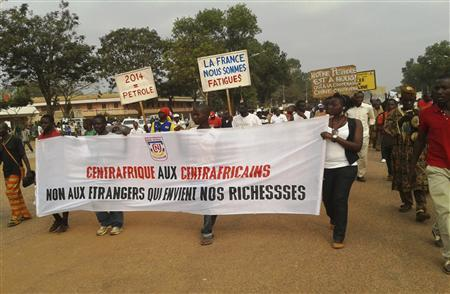Central African Republic Snubbed By France, U.S. As Rebels Advance Toward Capital

In anticipation of a rebel advance, the Central African Republic’s capital city of Bangui has grown quiet. Shops and restaurants are closing their doors as many of the city’s 600,000 people withdraw from the streets to seek refuge in their homes and, in some cases, pack their belongings.
Not everyone has gone into hiding just yet. Thousands ventured onto the streets on Thursday to demonstrate in solidarity with the administration of President Francois Bozize, who addressed the crowd in a speech.
But Bozize is feeling increasingly isolated as a coalition of insurgent fighters closes in on Bangui from the north. He has already secured help from the military of neighboring Chad, but is requesting more assistance from the West.
“We ask our French cousins and the U.S., the great powers, to help us to push back the rebels and to allow for dialogue in Libreville [Gabon] to resolve the current crisis," he said Thursday, according to Agence France-Presse.
But neither France – CAR’s former colonial power – nor the United States is willing to intervene, even though both powers have troops stationed in the country. Washington has urged American nationals to leave CAR, while Paris has beefed up security around its Bangui embassy, which was the target of protesters earlier this week.
Thursday evening, State Department spokesman Patrick Ventrell said the U.S. Embassy in Bangui had temporarily suspended operations and that the ambassador and other personnel had left the country.
"This decision is solely due to concerns about the security of our personnel and has no relation to our continuing and long-standing diplomatic relations with the CAR," he said, Reuters reported.
“If we are present, it is not to protect a regime, it is to protect our nationals and our interests, and in no way to intervene in the internal affairs of a country, in this case Central Africa,” said French President Francois Hollande. “Those days are gone.”
Hundreds of African troops have been deployed to CAR to protect the capital, but Bozize fears that without more foreign assistance, the rebel coalition that calls itself Seleka will overtake Bangui in coming days. His own army is notoriously weak, endemically fragmented, and prone to committing human rights abuses.
The insurgents are demanding that the administration abide by the rules of a series peace agreements made between 2007 and 2011, which were themselves instituted to stop earlier insurgencies and absorb rebel militants into the national army.
Seleka members complain that they have not been adequately paid for their service. They also bemoan the lack of development in the country, which is poverty-stricken despite CAR’s wealth of natural resources including gold, diamonds, uranium, oil and timber.
A rebel overthrow would be nothing new for CAR. Bozize himself came to power in a 2003 coup; he has since won two elections, though they have been deemed flawed by outside observers. Other coups of decades past, including the rule of the infamous "Emperor" Bokassa, have engendered unceasing of turmoil in the country of 5 million ever since it gained independence in 1960.
No administration has established a lasting security presence in areas far from Bangui, which is situated on the southern border of the western end of CAR, close to the Democratic Republic of Congo. In the north and further to the east, rebel groups of various stripes run rampant with relative impunity. The notorious Lord’s Resistance Army from Uganda has a presence in the southeastern reaches of CAR. In the northwest, Janjaweed militants from Sudan’s Darfur region have infiltrated the country in order to poach elephants for ivory.
Seleka, the group now advancing toward Bangui, coalesced this year from factions of three rebel organizations. One faction comes from an insurgent group called the Union of Democratic Forces for Unity, which is known by its French acronym UFDR. Another peeled off from an organization called the Convention of Patriots for Justice and Peace, or CPJP. The last comes from a group called the Wa Kodro Salute Patriotic Convention, or CPSK.
The insurgency has overrun government forces in several regional hubs in recent weeks, including Bria, which is rich in diamonds, and Bambari, CAR’s third-largest city. Without intervention from France or the United States, Bozize may be forced to negotiate with the approaching rebels – or else give up his post, leaving CAR open for yet another coup.
For now, all he can do is condemn the rebels’ tactics while he waits.
“There is no question of allowing them to kill Central Africans, of letting them destroy houses and pillage, and holding a knife to our throats to demand dialogue,” Bozize said Thursday.
© Copyright IBTimes 2024. All rights reserved.






















